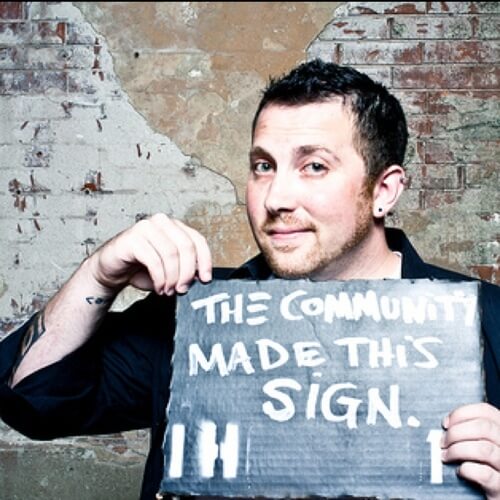Last night I got to tour Miner Street Recordings, the home of the Weathervane Music Incubator (disclosure, Geoff and I are both on Weathervane’s advisory board) & the birthplace of some incredible Philadelphia independent music. I found myself amidst talented musicians, cans and bottles of local beer, and a room full of instruments & recording gear unlike anything I’d ever experienced myself. My high-school days of doing musical theater sound design for a 1200 person auditorium came rushing back, and I found myself admiring Miner Street’s collection of recording equipment, only a fraction of which you can see in their recent Kickstarter video.
As Peter gave me a tour of the studio, he made it a point to highlight their analog equipment. In particular, a 2″ tape machine that only had one previous owner before Brian McTear. At Miner Street, they recorded to 2″ tape before dumping that recording into Pro Tools.
Peter called attention to the fact that many of Miner Street & Shaking Through’s fans write asking about which Pro Tools plugins were used to create the particular richness of sound that comes from their recordings, and Peter & Brian then have to figure out how to explain that it’s not a plugin, it’s an analog piece of equipment that they’ve made a critical part of their process.
The resulting effect of recording to analog before doing digital post-production is one of the many choices that make the music leaving Miner Street Studio a unique experience for the listener – not to mention the artists!
Meanwhile, it’s less efficient by almost any measure from many people’s point of view including my own – until I read Brian McTear’s perspective in the comments.
But the result is unmistakably special and in a world where we rush to commoditize everything, it’s powerful to find examples of commercial viability that is, in many ways, the product of an inefficiency.
Whose Experience Matters More?
This is not unlike many of the careful decisions we’ve made at Indy Hall and in our community & business development practices. There are many things that could easily be made more efficient, but only at the cost of an experience that’s otherwise irreplaceable. One of the simplest examples is how we handle conference room reservations.
Many coworking spaces & shared offices work to maximize efficiency of how their workspace is utilized (often because their business and their community are at odds with each other). This premature optimization comes at the cost of interactions between the members and the staff, the very interactions that are going to be necessary to grow their community and their business for the long term.
Now, I know that it’s easy to post a shared calendar, and there are increasingly bountiful options for automated reservation systems available. The problems are not the tools fault, it’s what the tools remove from the equation that leaves a void in the experience.
Similarly, the advent of Pro Tools and digital recording have not done harm to the music industry (I’m sure that Peter and Brian could expound on the benefits of digital recording), except that in many cases they’ve wholly replaced other elements of the process that brought more value than simply their function, leaving a void of richness that can’t be created with a plugin or software.
The problem we have with room scheduling tools is that they create an interaction that commoditizes the use of space in favor an efficient transaction rather than an interaction between humans that could yield unrealized or under-realized value.
In our case, scheduling a conference room is as simple as sending an email or better yet, speaking to one of our team members about marking the space off as yours for a session. This subtle difference creates just a little bit of friction that allows for a conversation, no matter how brief, between the member and the person now responsible for their reservation. What happens next could still be nothing, but we’ve made sure that potential hasn’t been extracted before it has a chance to be realized, prematurely optimized for a short-term gain in efficiency.
Don’t throw the baby out with the bathwater
When intentionally decreasing the efficiency of a workflow, you need to look closely at what you’re drecreasing. It’s easy to become dogmatic about a purpose, and ignore the practicality of what you’re trying to accomplish.
Inefficiency does not mean being a martyr for your purpose.
Instead, the goal is to seek inefficiencies that make you more effective.
This means getting close to the problem that you’re actually trying to solve and often breaking it into smaller problems, rather than looking for one “fix-it-all” solution.
In our case, the choice is to prioritize our interaction with members ahead the use of space because we know the difference it makes in our experience as well as theirs. We look at each interaction individually and consider the value of keeping it “analog” versus making it more efficient. We’re careful to make sure that our sacrifices don’t put the business or the community at risk.
Experience is a melody
It should go without saying that this isn’t about reserving conference rooms. That’s just one choice, which alone isn’t responsible for the entirety of the Indy Hall experience.
In music, a melody is a succession of notes that the listener perceives as a cohesive experience.
It’s the many deliberate choices, like the notes being strung together and sometimes a library of analog gear and talented people operating it, that allow us to create unique experiences that can’t be duplicated with a plugin or a piece of software.
 I am always thinking about the intersection of people, relationships, trust and business. I founded
I am always thinking about the intersection of people, relationships, trust and business. I founded